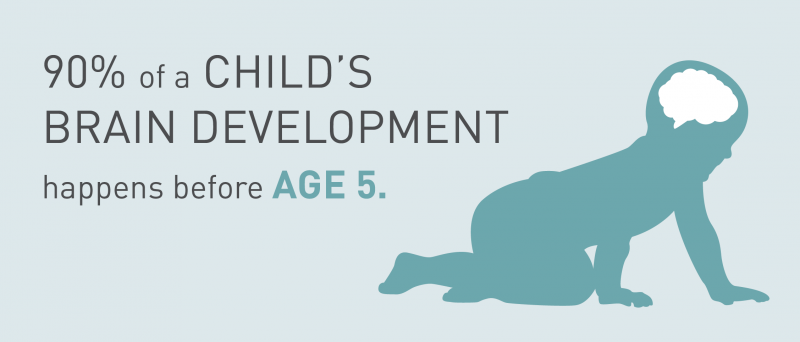Early Childhood Development
Children with access to high-quality early childhood programs — like this little girl from Lancaster — are more likely to succeed in school and relationships, to become adults who thrive and contribute to their communities.
GOAL: All kids receive high-quality early care and education
Why it matters
At an early childhood development center in Lancaster, an infant coos and squeaks, smiling at her teacher. Her teacher makes eye contact, smiles back and says “Well, good morning!”
Those people were not just passing the time. That baby’s brain just grew.
Research in pediatric neurology is conclusive: Healthy brain development and growth depend on positive social interaction early in life. A strong foundation in the preschool years is critical to all learning that comes later. In the absence of such experience, or when children experience significant stress, brain circuitry does not develop as it should — with devastating effects on cognitive and social growth that can lead to expensive problems later.
This baby in Lancaster is fortunate — because she is in a high-quality early learning center, she is more likely to succeed in school and relationships, to thrive in her community and in her career. But too many of our children are not getting that opportunity.
Many of the 27,000 New Hampshire kids who live in poverty lack access to high-quality early childhood development programs. Parents need access to other critical supports — parenting education, job training, financial literacy — that will help them to raise thriving kids.
By third grade, children from low-income households in New Hampshire have already fallen behind their better-off peers in math and reading. And they risk staying behind.
But solutions are at hand, with proven strategies that change that trajectory for kids.

Community investment during the early childhood years translates to school readiness, success in high school, higher levels of educational attainment, economic security, productivity and civic engagement — and savings in everything from special education costs to rehabilitation programs and prison costs.
Every dollar invested in early childhood development nets an average $7 return in productivity and saved societal costs — from savings in costly interventions later to gains in future productivity. Studies have shown that when disadvantaged children have increased quality early learning experiences, their earnings in adulthood are boosted by 25 percent.
Investing in our kids is an economic imperative. Kids who are supported by their communities today become adults who will contribute to those communities tomorrow. Like that baby in Lancaster, all of our kids deserve the early start that will help them thrive.
Strategies and progress to increase opportunity
The Foundation is working to increase the quality of early childhood programs serving children from struggling families and improve state policies and funding to support early care and education. Significant progress has been made to date, including:
- A generous grant from the Couch Family Foundation to support the position of Director of Early Childhood and Family Initiatives at the Charitable Foundation has provided support for the leadership driving progress in these areas.
- Thanks in part to the work of advocates trained through New Futures, funding was added to the state budget in 2018 for child care scholarships, full-day kindergarten and for home visiting and child protection.
- Foundation support was instrumental in helping the state secure a $3.8 million federal preschool development grant — an unprecedented opportunity to coordinate and strengthen early childhood programs while increasing collaboration and alignment of federal, state, local and non-governmental resources.
- With Foundation leadership, the state is developing a more robust system to measure the quality of child care centers, and the Foundation is funding the University of New Hampshire’s Child Study and Development Center to help centers undertake necessary improvements.
- The Neil and Louise Tillotson Fund continues to make deep investments in a coordinated system of care and services aimed at improving outcomes for every young child in Coös County.
We're here to help
To learn more about ways to help New Hampshire's kids thrive, contact:

- Christina D’Allesandro
- Director of Early Childhood and Family Supports
 603-225-6641 ext 262
603-225-6641 ext 262 Email Christina
Email Christina


